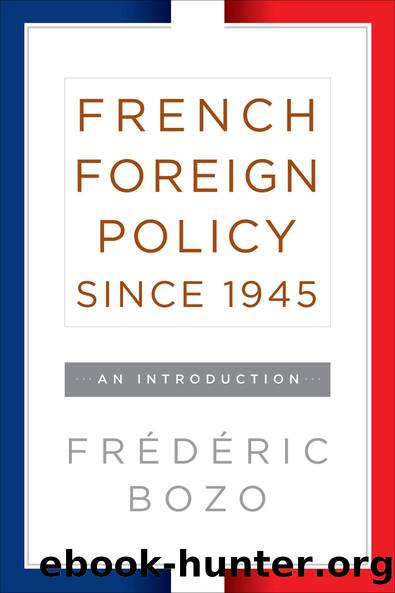French Foreign Policy since 1945 by Frédéric Bozo

Author:Frédéric Bozo [Bozo, Frédéric]
Language: eng
Format: epub
Tags: History, Europe, France, Political Science, International Relations, General
ISBN: 9781785332777
Google: PICLCwAAQBAJ
Publisher: Berghahn Books
Published: 2016-08-01T01:06:38+00:00
The Deterioration of East-West Relations
For France, however, the most crucial issues still centred on the old continent. The last years of Giscardâs presidency coincided with a noticeable deterioration in East-West relations, globally at first, then within Europe itself. This shift in an international context that had hitherto been dominated by détente had a major impact on Giscardâs foreign policy from 1979 onwards. Giscardâs policy, from then on, became more âGaullistâ, reasserting Franceâs specific position within the Western grouping and once again promoting French independence vis-à -vis the blocs. After an improvement in Franco-American relations in the first half of Giscardâs term in office, the second half saw them worsen once again, especially following the arrival of Jimmy Carterâs administration in January 1977. Carterâs unpredictable shifts in policy direction worried the Europeans, especially the French and the Germans, whose analyses converged on their assessment of US policy. The new US administrationâs strong activism on the issue of human rights in the Soviet bloc was seen in Paris and Bonn as counterproductive; Giscard saw Carterâs approach as overly âideologicalâ and liable to compromise relations with Moscow for no real gain. Like Schmidt, Giscard preferred a more discreet approach in these matters.
Furthermore, US policy seemed ambivalent when it came to strategic issues. The incoming Carter administrationâs willingness to review the ongoing SALT II negotiations â something that Moscow was unhappy with â made the Europeans nervous. The Germans feared that what they regarded as a crucial process of arms control could be compromised. At the same time, as illustrated by Schmidtâs important October 1977 speech in London, they were critical of the fact that the US-Soviet strategic negotiations tended to overlook the specifics of the European theatre and the new threat of the Soviet medium-range SS 20 missiles. In the meantime, the U-turn performed by Carter over the Enhanced Radiation Weapon (ERW), or âneutron bombâ, dealt a severe blow to his credibility (Carter had initially called for ERW deployment in spite of Schmidtâs reservations, before finally abandoning the idea in 1978, causing major domestic difficulties in the FRG). In this context, French policy had to strike a delicate balance; its aim was to work towards maintaining a strategic equilibrium while at the same time preserving détente in Europe, and to contribute to strengthening Western security while defending Franceâs independence within the Alliance. Caught between a US administration now set on deploying new weapons systems and a Federal Germany that favoured negotiation in order to remove the threat posed by the SS 20s, Giscard sought to forge a middle path. Keen to take the position of his German partner into account, he summoned, with Schmidtâs agreement, a summit meeting of the leaders of the Allianceâs four great powers, the first of its kind. At the Guadeloupe summit (5â6 January 1979) Carter, Giscard, Schmidt and UK Prime Minister James Callaghan reached a compromise: the Western Alliance would negotiate with the Soviets in order to obtain the removal of the SS 20s, but if negotiations failed, the United States would deploy Pershing II and cruise missiles in western Europe.
Download
This site does not store any files on its server. We only index and link to content provided by other sites. Please contact the content providers to delete copyright contents if any and email us, we'll remove relevant links or contents immediately.
| Arms Control | Diplomacy |
| Security | Trades & Tariffs |
| Treaties | African |
| Asian | Australian & Oceanian |
| Canadian | Caribbean & Latin American |
| European | Middle Eastern |
| Russian & Former Soviet Union |
The Secret History by Donna Tartt(16623)
The Social Justice Warrior Handbook by Lisa De Pasquale(11489)
Thirteen Reasons Why by Jay Asher(7788)
This Is How You Lose Her by Junot Diaz(5772)
Weapons of Math Destruction by Cathy O'Neil(5037)
Zero to One by Peter Thiel(4824)
The Myth of the Strong Leader by Archie Brown(4789)
Promise Me, Dad by Joe Biden(4447)
Beartown by Fredrik Backman(4418)
Stone's Rules by Roger Stone(4415)
How Democracies Die by Steven Levitsky & Daniel Ziblatt(4398)
The Fire Next Time by James Baldwin(4342)
100 Deadly Skills by Clint Emerson(4077)
A Higher Loyalty: Truth, Lies, and Leadership by James Comey(4032)
Rise and Kill First by Ronen Bergman(4012)
The David Icke Guide to the Global Conspiracy (and how to end it) by David Icke(3881)
The Farm by Tom Rob Smith(3872)
Secrecy World by Jake Bernstein(3782)
The Doomsday Machine by Daniel Ellsberg(3731)
